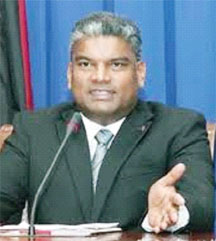(Trinidad Guardian) Attorney General Anand Ramlogan has refused a request from Director of Public Prosecutions (DPP) Roger Gaspard, SC, to suspend the ongoing Commission of Enquiry into the collapse of Clico and the Hindu Credit Union (HCU. Gaspard has said Ramlogan has dismissed his request —made in several letters—for the AG to advise President George Maxwell Richards to suspend the commission immediately, or at least to vary its terms of reference.

In fact, the DPP said he had to caution Ramlogan that unless he so advised Richards immediately, his inaction might lead to the conclusion that the AG was “abdicating his duty to preserve the integrity of the administration of criminal justice in this case.”
In a strongly-worded six-page letter, obtained by the T&T Guardian, Gaspard wrote to commission chairman Sir Anthony Colman yesterday, giving a detailed account of his interaction with Ramlogan and expressing concern over the AG’s refusal to fully outline to Colman the consequences of the ongoing criminal probe into Clico and the HCU.
He said if the enquiry went on, it was likely to delay a prosecution and jeopardise the police investigation In addition, the DPP warned Colman, “There would be a greater sense of outrage if the continuation of your enquiry were to result in a potentially strong and credible prosecution being stayed as an abuse of process.”
In a letter dated September 10, Gaspard said, he told Ramlogan there should be a criminal investigation into the collapse of Clico, and outlined the allegations to be investigated. Ramlogan responded on October 5, saying all the necessary support for a criminal investigation would be provided.
On October 19, the DPP wrote to Ramlogan again, expressing concern and asking him to advise the President to suspend the Commission immediately or vary its terms. He asked Ramlogan to deal with the matter urgently. Gaspard said on November 1, he again wrote to the AG, reinforcing his concerns about the effect the enquiry would have on the criminal investigation and asked the AG to inform Colman of the situation.
Should Colman not intervene by November 5, Gaspard said, he would contact the commission chairman directly.
The following day, Ramlogan replied that he was declining Gaspard’s request to advise the president to suspend the enquiry. Gaspard told Colman the AG’s position appeared to be that “there was a greater public interest in your enquiry continuing rather than preserving the credibility and integrity of the criminal investigation and prosecution of those who may be responsible for any criminal wrongdoing.”
The DPP said Ramlogan told him his concerns ought to be left to Colman’s good sense, as Colman would have a better grasp and appreciation of the evidence and be able to take the steps he felt necessary. “The Hon AG,” Gaspard wrote, “also took the position that he could not advise you on how to conduct your enquiry as you were wholly independent and need only take advice from counsel appointed to assist you in the conduct of your commission.”




